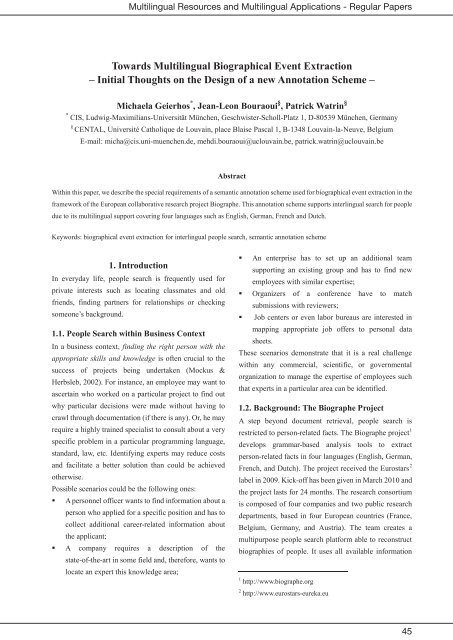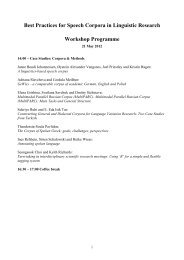96 • 2011 - Hamburger Zentrum für Sprachkorpora - Universität ...
96 • 2011 - Hamburger Zentrum für Sprachkorpora - Universität ...
96 • 2011 - Hamburger Zentrum für Sprachkorpora - Universität ...
You also want an ePaper? Increase the reach of your titles
YUMPU automatically turns print PDFs into web optimized ePapers that Google loves.
Multilingual Resources and Multilingual Applications - Regular Papers<br />
Towards Multilingual Biographical Event Extraction<br />
– Initial Thoughts on the Design of a new Annotation Scheme –<br />
Michaela Geierhos * , Jean-Leon Bouraoui § , Patrick Watrin §<br />
* CIS, Ludwig-Maximilians-<strong>Universität</strong> München, Geschwister-Scholl-Platz 1, D-80539 München, Germany<br />
§ CENTAL, Université Catholique de Louvain, place Blaise Pascal 1, B-1348 Louvain-la-Neuve, Belgium<br />
E-mail: micha@cis.uni-muenchen.de, mehdi.bouraoui@uclouvain.be, patrick.watrin@uclouvain.be<br />
Abstract<br />
Within this paper, we describe the special requirements of a semantic annotation scheme used for biographical event extraction in the<br />
framework of the European collaborative research project Biographe. This annotation scheme supports interlingual search for people<br />
due to its multilingual support covering four languages such as English, German, French and Dutch.<br />
Keywords: biographical event extraction for interlingual people search, semantic annotation scheme<br />
1. Introduction<br />
In everyday life, people search is frequently used for<br />
private interests such as locating classmates and old<br />
friends, finding partners for relationships or checking<br />
someone’s background.<br />
1.1. People Search within Business Context<br />
In a business context, finding the right person with the<br />
appropriate skills and knowledge is often crucial to the<br />
success of projects being undertaken (Mockus &<br />
Herbsleb, 2002). For instance, an employee may want to<br />
ascertain who worked on a particular project to find out<br />
why particular decisions were made without having to<br />
crawl through documentation (if there is any). Or, he may<br />
require a highly trained specialist to consult about a very<br />
specific problem in a particular programming language,<br />
standard, law, etc. Identifying experts may reduce costs<br />
and facilitate a better solution than could be achieved<br />
otherwise.<br />
Possible scenarios could be the following ones:<br />
� A personnel officer wants to find information about a<br />
person who applied for a specific position and has to<br />
collect additional career-related information about<br />
the applicant;<br />
� A company requires a description of the<br />
state-of-the-art in some field and, therefore, wants to<br />
locate an expert this knowledge area;<br />
� An enterprise has to set up an additional team<br />
supporting an existing group and has to find new<br />
employees with similar expertise;<br />
� Organizers of a conference have to match<br />
submissions with reviewers;<br />
� Job centers or even labor bureaus are interested in<br />
mapping appropriate job offers to personal data<br />
sheets.<br />
These scenarios demonstrate that it is a real challenge<br />
within any commercial, scientific, or governmental<br />
organization to manage the expertise of employees such<br />
that experts in a particular area can be identified.<br />
1.2. Background: The Biographe Project<br />
A step beyond document retrieval, people search is<br />
restricted to person-related facts. The Biographe project 1<br />
develops grammar-based analysis tools to extract<br />
person-related facts in four languages (English, German,<br />
French, and Dutch). The project received the Eurostars 2<br />
label in 2009. Kick-off has been given in March 2010 and<br />
the project lasts for 24 months. The research consortium<br />
is composed of four companies and two public research<br />
departments, based in four European countries (France,<br />
Belgium, Germany, and Austria). The team creates a<br />
multipurpose people search platform able to reconstruct<br />
biographies of people. It uses all available information<br />
1<br />
http://www.biographe.org<br />
2 http://www.eurostars-eureka.eu<br />
45



